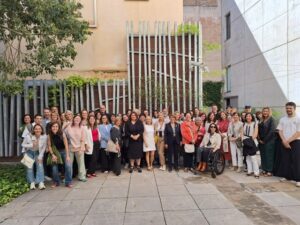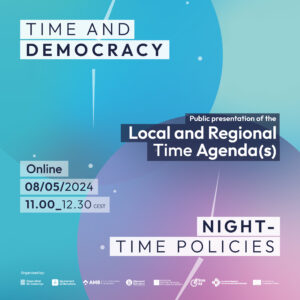The EU must end seasonal clock changes, as changing clocks to the wrong time zone negatively impacts individual health and the economy
EU Parliament elections taking place the next coming June 9 are foreseen as a key opportunity to influence the different EU political parties/representatives to take a step forward, as the Council of the European Union has not yet implemented the plan of ending clock change in Europe.
Ending seasonal clock change by 2026 is one of the 12 suggested measures included in the EU Manifesto on Time Policies launched by the Time Use Initiative to assure the right to time in Europe
Once more, the next coming March 31, Europeans are changing their clocks this weekend to the wrong time zone, although there is mounting evidence that doing so harms public health and the economy. Over the past 30 years, more and more studies demonstrate the negative impact of how living in the wrong time zones has a negative impact on energy saving, on risk of cancer and other diseases as there are diabetes, obesity, metabolic disorders, on performance of workers and students, or the GDP, amongst other issues, as mental disturbance, fatigue, lethargy, decrease in concentration…DST also increases photochemical pollution and greenhouse effect ( Ozone O3),
Although last year experts asked the presidency trio of the Council of the European Union to add the topic to the agenda and implement the proposed plan of ending clock change in Europe, this has not been done yet. This year, on June 9, there will be EU Parliament elections, and experts foresee it as an important chance to influence EU political parties/representatives to take the decision on ending seasonal clock change.
EU Manifesto on Time Policies asking to end clock change by 2026
The Time Use Initiative has thus launched a EU Manifesto on Time Policies including 12 necessary changes Europe needs to make in order to assure the right to time to all the Europeans.
Time is an increasingly scarce and unequal resource. 20% of European citizens, and 34% of women with children, experience time poverty. The consequences of time poverty and time inequality are far-reaching, affecting both individual well-being and social cohesion. European citizens’ right to time should be then safeguarded and nurtured.
One of the proposals is that the EU must end seasonal clock changes – a path to quickly reap benefits for health, the economy, and the environment. The manifesto states: “The EU must react to the negative impact of misaligned clocks by pushing to implement permanent time zones as close as possible to solar time (natural time) in Europe.
Misaligned clocks that make schedules start earlier than the natural day-night cycle (like in Western European member states and everywhere during “summer time”) increase sleep deprivation and cause negative effects on human health, economy, and safety. The EU has the power to change this”.
For all these reasons the Manifesto proposes the formulation of a roadmap towards ending DST (Seasonal clock change) by 2026. “Seasonal clock change is outdated, and the EU can finally end it. Based on the proposal done by the European Commission in 2018, the European Commission, and specially the EU Council, should propose a roadmap towards ending DST no later than 2026.
The roadmap should be particularly focused on sectors that may expect a higher impact such as emergency and transport services to prepare for the change and should be accompanied by a public awareness campaign. The roadmap should be based on the Proposal on implementing permanent time zones in the European Union (2022), elaborated by experts”.
Myths on DST
Nevertheless, beliefs and myths around the need of maintaining Daylight Saving Time (DST) persist amongst the public opinion and the political debate. These beliefs are one of the key reasons why the EU has not yet taken a decision on ending clock change, extending the harmful effects it has for most of the population.
Given the current energy crisis, one of the key myths is that DST saves energy. Recent studies point out that either there is no effect, or even worse, DST could be making us spend more energy, given current consumption patterns, which increase the spending on cooling and heating.
Another common one is that it might hurt the economy, especially certain sectors such as tourism and leisure or retail. Regarding that argument, there are three issues to take into account. First, that the current setup is already hurting the economy by provoking sleep deprivation in a large part of the population, and as a consequence, working people are less productive, have more accidents at work and take more sick leave. Second, during the work week, there is not much change under DST in terms of commerce, as people have to continue with their set social schedules. But at the weekend, most people sleep in to compensate for sleep deprivation, thus having less time to shop. Finally, it is not DST, but summer and the good weather that drives tourism and leisure. Overall, the economy will benefit if DST is abolished and natural time zones are restored.
Finally, some people have the fear that stopping clock changes would mean they have to change their daily habits. The International Alliance for Natural Time (IANT) reassures that since habits are already constant throughout the year by clock time, they can remain the same. A natural time zone only means that we are adjusting the clock time to reflect the real time of day, which better aligns with our own circadian rhythms.
Permanent time zones, waiting for the Council of the European Union’s decision.
For further resources on the issue, the International Alliance for Natural Time (IANT), in which TUI participates, launched last year a social media campaign with the most frequently asked questions about changing clocks and living permanently in a natural time zone. Some might be surprising.








